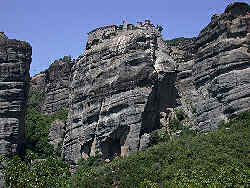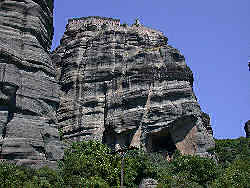Δρακοσπηλιά
Dragon Cave
Useful Information

| Location: |
Near Kalambaka.
(39.72455925740612, 21.630091649713012) |
| Open: |
No restrictions. [2010] |
| Fee: |
free. [2010] |
| Classification: |
 Tectonic cave Tectonic cave
|
| Light: | n/a |
| Dimension: | |
| Guided tours: | self guided |
| Photography: | allowed |
| Accessibility: | no |
| Bibliography: |
Georgios Lazaridis (2020):
Caves in the conglomerates of the Meteora geosite (Greece),
Cave and Karst Science 47(1):6-10.
researchgate
|
| Address: | |
| As far as we know this information was accurate when it was published (see years in brackets), but may have changed since then. Please check rates and details directly with the companies in question if you need more recent info. |
|
History
Description


Δρακοσπηλιά (Drakospilia, Cave of the Dragon) is the biggest and most prominent of all caves at Meteora.
Varlaam Monastery (also Barlaam Monastery) was named after the monk Varlaam, who built the first chapel on this rock in the 14th century. It was enlarged by two brothers from the monastery at Ioannina during the 16th century. According to legend, they had to drive away the monster who lived in a cave on the summit before they could move in.
The Drakospilia does not really fit to this legend, as it is located at the foot of the rock, not at the summit. It is a huge through cave which is obviously a result of a collapse or rockfall. The huge blocks and the debris can be found at the foot of the rock. The cave is easy to see from the road.
Once upon a time a Dragon used to live inside a huge cave beneath the Varlaam monastery. Each night the dragon went to the village Kastraki to feed on the people and their livestock. The people became very desperate but were unable to deal with the dragon by themselves. So they went to the monastery of Varlaam for help and guidance. A monk saw their desperation and decided to sacrifice himself in order to help them. He cursed the dragon and then jumped from the cliff and died. Immediately the ceiling of the cave collapsed and the dragon was killed by the rockfall.
 Search DuckDuckGo for "Drakospilia Cave"
Search DuckDuckGo for "Drakospilia Cave" Google Earth Placemark
Google Earth Placemark The legend of the Dragon’s Cave (visited: 21-APR-2021)
The legend of the Dragon’s Cave (visited: 21-APR-2021) Index
Index Topics
Topics Hierarchical
Hierarchical Countries
Countries Maps
Maps